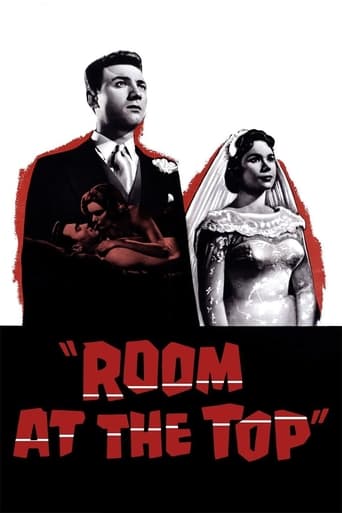jc-osms
I recently read the John Brain novel and so was keen to see this celebrated adaptation of it. It was the debut feature of director Jack Clayton, two of whose relatively small number of succeeding films I've seen and enjoyed ("The Innocents" and "The Great Gatsby"). I'm a fan of the British realist cinema movement of the late 50's and early 60's and see this movie as a trailblazer for other important films which followed.Set in the immediately post-war period as witness the bomb-site locations which appear throughout as backdrops, the film unquestionably speaks to societal attitudes of masculinity, marriage, class snobbery, provincialism and morality still prevalent at its time of release in 1959.I was pleased to see in the credits that the director of photography was the great British cameraman Freddie Francis and he doesn't disappoint with typically imaginative and memorable set-ups and portraits. In one tracking shot I'm sure I detected a hand-held camera tracking shot long before it became the vogue. The story of a young working class accountant on the make is gripping and grittily portrayed, although perhaps this distinctly non-working class occupation with a taste for amateur dramatics belies the underlying class-war which underpins Lawrence Harvey's Joe Lampton character's cynical path up the greasy pole - namely to bed and wed the virginal young daughter of the monied industrialist with influence everywhere in the Northern town where his factories are based.What he doesn't count on is falling sideways into a steamy affair with older woman Alice Aisgill herself the put upon wife of her obviously philandering husband, when they meet at the local theatre rehearsing a play. At first she's just a bit-on-the-side while he works out his plan to entice sweet young Susan but Alice's worldliness and maturity speak to Joe far more than Susan's perkiness and naïveté. Of course Joe's balancing act has to fail and it does so after he cynically deflowers Susan, getting her pregnant in the process and bringing himself into the line of fire of the seemingly omnipotent father and so inadvertently gets what he originally wanted, an easy path to the upper classes and all the wealth, comfort and privilege that go with it, only when he gets up close to it, the grass is far from the verdant green he believed it would be.Clayton's direction is assured and stylish. There are many memorable scenes, perhaps none more than in the climactic scene where a newly-engaged Joe learns at his office of Alice's fate with a clever piece of overlapping dialogue. The movie is decidedly adult in its attitude to sex, not only the extra-marital affair between Joe and Alice, but also in the cold calculating way Joe takes away the too-trusting and adoring Susan's virginity. Even the language is more direct and abrasive than you'd expect, especially the tirade that Alice's flat mate Elspeth lets rip at Joe after he dazedly returns to the flat where he and Alice shared their trysts.As regards the acting, I'd have to agree with those critics who contend that Harvey just doesn't seem quite working class enough for the part. Possibly the movie came just too early for actors who would have carried off the role better like Albert Finney or Richard Harris, although their time would soon come. Simone Signoret was good value for her Oscar as the doomed Alice, but the casting all the way down the credits is uniformly good.An epochal British film, blazing a trail for the kitchen sink dramas of the next decade, but one which still stands up today on its own merits.
lavatch
In 1956, John Osborne wrote his play "Look Back in Anger," which was a turning point in British drama in examining class revolt and changing social conditions in England in the post war years. But while Osborne's play is now virtually forgotten as a "kitchen sink" period piece, "Room at the Top," which examines similar issues in the film medium, has stood the test of time.Laurence Harvey stars as the social climber from humble origins, a role that is the reincarnation of Osborne's "angry young man" Jimmy Porter in "Look Back in Anger." Porter succeeds in marrying a woman above his social rank, then abuses her. But as portrayed by Harvey, the character of Joe Lampton is much more complex, as his driving ambition to win the hand of the daughter of an influential industrialist is balanced by his soulful connection to an older married woman. The self-loathing of Lampton is apparent throughout, as he constantly humiliated by his social superiors. Possibly the worst abuse comes from his future mother-in-law, who is dripping in contempt for what she perceives as a commoner. In the process, Joe becomes nearly as tortured as Raymond Shaw, the protagonist of "The Manchurian Candidate," for which Laurence Harvey will always be remembered.In the portrayal of the younger woman named Susan, Heather Sears is outstanding for her naivety and cheerful optimism in the attraction she feels for Joe Lampton. But it is in the interpretation of the older woman, Alice Aisgill, that the film will always be remembered for the transcendent performance of Simone Signoret.Signoret's portrayal of Alice as the vulnerable French expatriate in a loveless marriage to a British highbrow is almost a mirror image of the social misfit Lampton. The characters bond in their common ground as outsiders in the claustrophobic British class system in the fictional town of Warnley. In virtually all of her scenes, Signoret is magnetic in her sensitivity, as especially apparent in her eyes.Every viewer will have his or her favorite scene in this film. For me, it is moment in the cottage where Joe and Alice have escaped to an idyllic seaside retreat where they rush into the house out of the rain. Joe offers Alice a cigarette, but she refuses. She tells him that she wishes to abstain for smoking and drinking during their holiday for she wants each of their moments together to remain "clear and sharp" in her memory. This unforgettable moment could only be realized by a performer of Signoret's abilities.Led by Signoret, Harvey, and a stellar cast of British actors, this old-style black-and-white film with the rapid-fire pacing and wrenching emotional ending rises to the top as one of the great cinematic experiences of the second half of the twentieth century.
robert-temple-1
This film won an Oscar, as did Simone Signoret for best actress and the screenwriter Neil Paterson for best screenplay. It made a huge hit when it was released, and it had a major social impact in Britain as well. Based on the best-selling novel by John Braine, the film dealt with the aspirations of the working class to rise in the world, and the intimidation they felt from the rich upper middle class, in this case a Yorkshire mill-owner, played with ruthless honesty and typical Yorkshire bluntness by Donald Wolfit. The hero, or I should really say anti-hero, of the story is Joe Lampton, played by Lawrence Harvey. His desire to get on in life is all-consuming, and he is desperate to escape the row cottage in the small Yorkshire mill town where he has grown up with his widowed mother. He was in the RAF in the War, but was only a sergeant, and spent most of the War as a POW. It is 1947 and he has now returned to civilian life and has to decide what to do. So he moves to a larger mill town, which is not an entirely working class location, and gets a job in the offices of the local textile mill. On his very first day, he sees the pretty young daughter of the mill owner and decides he is going to 'get' her, both because he wants her and as a means of advancement. He is brutally frank about wanting to 'marry a million pounds'. He wants to get to the 'top'. Wolfit\s daughter is played by the young Heather Sears. It is a great pity that she did not appear in the sequel film LIFE AT THE TOP (1965, see my next review), and that she was replaced with Jean Simmons, who was not right for the part, and the difference in tone destroyed much of the continuity. Heather Sears was absolutely perfect. She played the daughter as a sweet, dreamy, but spoilt and wilful creature lost in her romantic notions. She is completely dazzled by Larry Harvey and in love with him, and keeps saying to him as things work out for them: 'Isn't it wonderful?' For her, she is living out a romantic dream. But she is far from a passionate creature in the carnal sense, which is essential to the story. For that side of things, Harvey has his own passionate love affair with the woman who is to be the one true love of his life, played by Simone Signoret with overwhelming soulful intensity. Signoret could say more with her bedroom eyes than almost any actress one can think of. You can see her thinking, and what is more, you can see her feeling. That takes some doing in moments without dialogue. She certainly deserved her Oscar. Larry Harvey's performance is wonderful and dominates the film, as indeed it should. The film is magnificently directed by Jack Clayton, and is one of his finest achievements. The cinematography by Ossie Morris is even better than his usual superb standard, with Brian West as operator. I knew (at a later date, not when this was made) so many people connected with this film, not least Larry and Jack. Alas, I never met Signoret. That would have been something. This film is a real classic, powerful, emotional, upsetting, compulsive viewing, and deeply tragic. It is what can be called without hesitation 'the real thing'.
ivegonemod
Oh how I enjoyed this film, that's what it was, a film, not just a movie. I can't believe it took me so long to watch, silly me had it on my DVR since March/05/2012 and never felt like watching it. I just finished it now.The acting from the leads was superb! I loved Alice and Joe. The acting from so many of the actors was top-notch, only the character Susan was a bit of a drag. How I hate that Joe would be stuck with her whiny and silly self. He did realize that what he thought he wanted wasn't what he wanted at all, and look how he messed everything up. Poor dear Alice! I was hoping all would end well, but I knew it would not. I just knew it. Joe is going to be wealthy and have a life that his friends would never have, but he truly learned that his love for Alice meant more than anything to him. Can you imagine having to listen to Susan for years to come?





